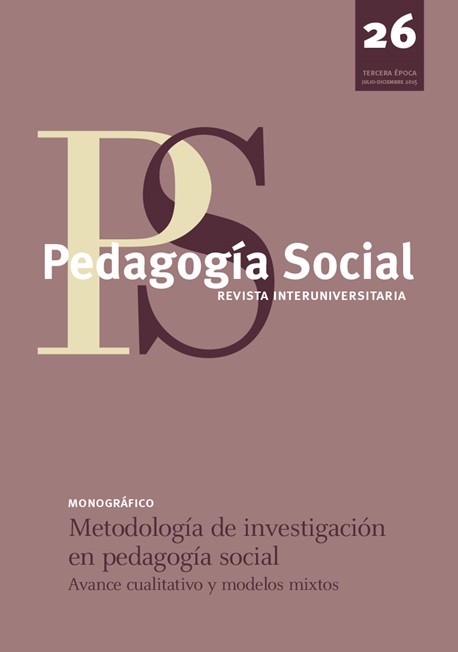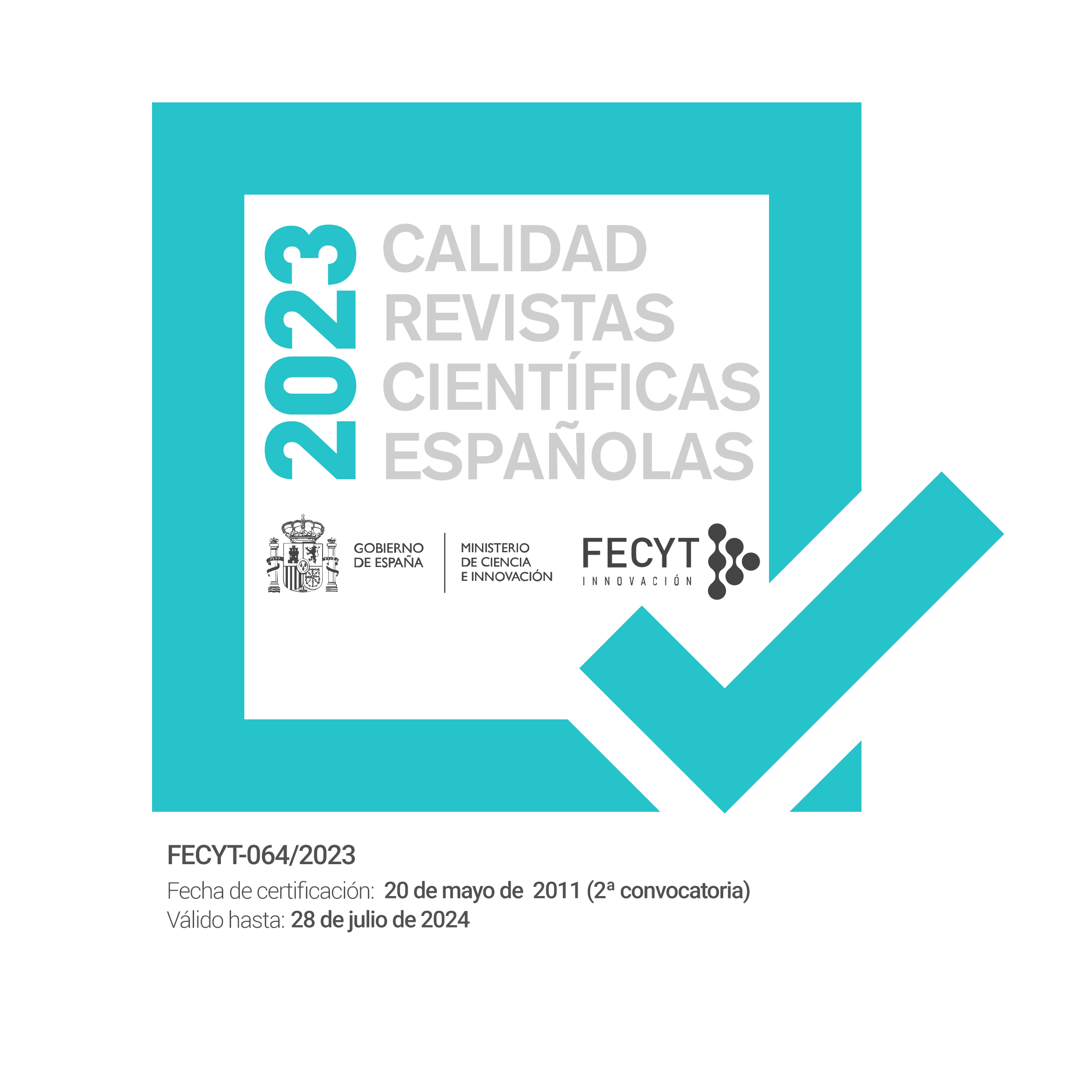The teaching-learning process of older students university: assessment of the teaching function
DOI:
https://doi.org/10.7179/PSRI_2015.26.11Keywords:
adult education, teacher training, teaching styles, educational assessmentAbstract
The process of education - learning in the bosom of the university for major supposes knowing the characteristics of the learning of this group of population. In the same way, the education must be adapted to these characteristics, for what the professional who exercises his educational function in this area will have to be a specific professional whose formation is integral, adapted to this population and socially skilfully. The knowledge is not definitive, the static learning and not even the major persons have to have the opportunity to accede to a dynamic and permanent learning to facilitate an integral development to them.
In this article the characteristics of the teacher are identified and value for the frame of the University Programs for Major (PUM's). For the bosom of an research evaluative, under the model Cipp de Stufflebeam (1989), the major ones, the coordinators of the Program and the teachers valued different aspects of the educational function. This educational evaluation carried out during the first three courses of the Program UNED SENIOR. It was formed from four types of evaluation that the model was demanding: context, entry, process and product, being multiple the variables identified for the investigation. There were elaborated 9 questionnaires, one by course and group of participants. 3 populations were estimated: Pupils (N1); Teachers (N2) and Coordinators (N3); and three representative samples were calculated for every application. The study carried out with a total of n valid for every population of n1=1083, n2=124 and n3 = 33. The instruments turned out to be highly trustworthy on having presented Spearman-Brown's coefficients between 0,7 and 0,9.
The technologies of analysis of classification, reduction and segmentation demonstrated the features and skills of the teacher, as well as they formed the "ideal" characteristics of a good teacher in the area of the PUM's. In addition the results showed that the major pupils demonstrated his interest for an educational active and participative methodology that should help them to fix the knowledge and they will provoke satisfactory changes in his personal and social life.
Downloads
References
Asociación Estatal de Programas Universitarios para Mayores (AEPUM) (2012). Monográfico, 1. Retrieved from http://www.envejecimientoactivo2012.es/InterPresent1/groups/imserso/documents/binario/boletin_monogrfico_aepumfinal.pdf
Barrero Díaz, B., Guerra Gutiérrez, L., Lozano Martínez, L., Rey-Seijó, E., & Roca Sierra, M. (2010). Indicadores para la construcción de un sistema de evaluación de la calidad de la función tutorial en los Programas Universitarios para Mayores. XI Encuentro Estatal de Programas Universitarios para Mayores, Lérida. Retrieved from http://www.senior.udl.cat/11encuentro/cd_actas/Originals/La%20calidad%20en%20los%20programas%20universitarios%20para%20mayores.pdf
Cabedo & Alfageme (2006). Los Programas Universitarios para Mayores en España: Una investigación sociológica. Castellón de la Plana: Publicaciones de la Universidad Jaume I.
Cuenca, M. E. (2011). La motivación hacia el aprendizaje en las personas mayores. Más allá del rendimiento académico. Revista Psicología y Educación, 1(6), 239-254.
Cuenca, M. E. (2013). Cómo intervenir en personas Mayores. In Pérez & De Juanas (Eds.), Calidad de vida en personas adultas y mayores (pp. 247-291). Madrid: UNED.
Cuenca, M. E. & De Juanas, A. (2011). Experiencia de aprendizaje cooperativo en un contexto virtual universitario. In Román, J. M. Carbonero, M. A. & Valdivieso, J. D. (Eds.), Educación, aprendizaje y desarrollo en una sociedad multicultural, (pp. 5679-5689). Madrid: Asociación Psicología y Educación.
IMSERSO (2011). Libro blanco de Envejecimiento Activo. Madrid: Ministerio de Sanidad, Política Social e Igualdad.
Lirio Castro & Morales Castro, S. (2012). El reto de la formación del profesorado para una enseñanza de calidad en las universidades de mayores. Pedagogía Social. Revista Interuniversitaria, 19, 155-166. Retrieved from http://www.upo.es/revistas/index.php/pedagogia_social/article/view/76
Navarrete, B. (2009). La motivación en el aula. Funciones del profesor para mejorar la motivación en el aprendizaje. Innovación y experiencias educativas, 15.
Palmero Cámara, C. (2011). Factores decisivos en la calidad de la formación universitaria de personas mayores. IV CONGRESO IBEROAMERICANO DE UNIVERSIDADES PARA MAYORES "Aprendizaje a lo largo de la vida, envejecimiento activo y cooperación internacional". Alicante. UIMP y Asociación Estatal de Programas Universitarios para Mayores (AEPUM). 27 al 30 de junio 2011. pp. 269-288 Retrieved from http://rua.ua.es/dspace/bitstream/10045/20200/1/CIUUMM%202011%20tomo%20I.pdf
Pérez, R. (2006). Evaluación de Programas Educativos. Madrid: La Muralla
Pérez Serrano, G. (2006). “Estereotipos, vejez y bienestar social” En Pérez Serrano (Ed.), Calidad de vida en personas mayores (pp.51-75). Madrid: Dykinson.
Rodríguez Martínez, R. (2011). Los Programas Universitarios para Personas Mayores: objetivos y diseño curricular. IV CONGRESO IBEROAMERICANO DE UNIVERSIDADES PARA MAYORES "Aprendizaje a lo largo de la vida, envejecimiento activo y cooperación internacional". Alicante. UIMP y Asociación Estatal de Programas Universitarios para Mayores (AEPUM). 27 al 30 de junio 2011. pp 43-62 Retrieved from http://rua.ua.es/dspace/bitstream/10045/20200/1/CIUUMM%202011%20tomo%20I.pdf
Sallán, J. G., Gómez, D. R., Armengol, C., & del Arco Bravo, I. (2013). El acceso a la universidad para personas mayores en España. Los programas universitarios para personas mayores: revisando la realidad. Revista de orientación educacional, (51), 45-65.
Stadelhofer, C. (2002). El significado de la formación general científica permanente para adultos mayores en el umbral del siglo XXI. En Bru Ronda, C. et al., Los Modelos Marco de Programas Universitarios para Mayores (pp. 89-110). Alicante: Universidad Permanente de Alicante.
Downloads
Published
Issue
Section
License
Copyright (c) 2015 Pedagogia Social. Revista Interuniversitaria

This work is licensed under a Creative Commons Attribution-NonCommercial 3.0 Unported License.
Copyright and right to archive
The published version of the articles can be self-archived by their authors in open access institutional and thematic repositories. However, Pedagogía Social. Revista Interuniversitaria must authorize partial or global reutilisation on new papers or publications.
Published papers must be cited including the title of the journal Pedagogía Social. Revista Interuniversitaria, issue, pages and year of publication
Ethical responsibilities
Pedagogía Social. Revista Interuniversitaria does not accept any material that has been previously published in other documents or publications. Authors are responsible for obtaining the required permissions for partial or global reproduction any material from other publications, and to correctly quote its origin.
Pedagogía Social. Revista Interuniversitaria is obliged to detect and report fraudulent practices.
Only those who have intellectually contribute to the development of the paper must appear as authors.
The journal expects authors to declare any commercial partnership that might entail a conflict of interest with respect to the submitted article.
Authors must mention in the article, preferably in the “methodology” section, that the procedures used during the samplings and controls have been made after getting informed consent.
The journal will not use any received contribution in a way other than the goals described in these guidelines.
Copyright Notice
© Pedagogía Social. Revista Interuniversitaria. Papers published in both the printed and online versions of this Journal are property of Pedagogia Social. Revista Interuniversitaria, being required to cite the source in any partial or total reproduction.
Unless otherwise stated, all content of this electronic journal is distributed under "Creative Commons Attribution-Non commercial 3.0 Spain" (CC-by-nc) license for use and distribution. The informative version and the legal text of this license is available here. This has to be expressly stated in this way when necessary.





